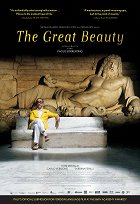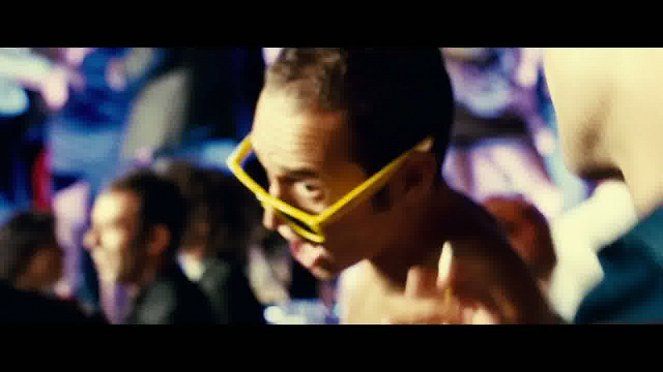Regie:
Paolo SorrentinoKamera:
Luca BigazziMusik:
Lele MarchitelliBesetzung:
Toni Servillo, Sabrina Ferilli, Carlo Verdone, Carlo Buccirosso, Isabella Ferrari, Giorgio Pasotti, Franco Graziosi, Serena Grandi, Luca Marinelli (mehr)Streaming (5)
Inhalte(1)
Obwohl er vor mittlerweile 40 Jahren einen gefeierten Roman geschrieben hat, hat der hoch angesehene Autor Jep Gambardella (Toni Servillo) diesem großen Erfolg nie ein Zweitwerk folgen lassen. Stattdessen arbeitete er als anerkannter Journalist, ließ es sich auf Partys gutgehen und philosophierte vor sich hin. Doch hinter der Fassade des Lebemannes steckt ein höchst desillusionierter Mann, dem die Oberflächlichkeit Roms mehr und mehr zusetzt. An seinem 65. Geburtstag, den Jep mit einer ausschweifenden Feier begeht, blickt er zurück auf sein Leben. Obwohl es ihm nie an weiblicher Gesellschaft mangelte, gehen seine Gedanken immer wieder zurück zu seiner großen Liebe, die er niemals haben konnte. Als er erfährt, dass diese gerade im Sterben liegt, wird seine Wehmut noch größer. Gerne würde er wieder schreiben um dem Leben einen Sinn zu geben, denn Jep wird klar, dass alles vergänglich ist und auch er nicht ewig leben wird. (Verleiher-Text)
(mehr)Kritiken (10)
Episoden aus dem Leben der römischen Highsociety, die allein schon ein Filmemacher-Glamour sind. Ein Bildjuwel, das nicht nur visuell, sondern auch inhaltlich abstrakt ist. Beim ersten Mal schafft man es überhaupt nicht, alles wahrzunehmen. Wegen den vielen Gedanken und Reflexionen muss man sich den Film nochmal ansehen. Und auch wenn man dann wieder nicht alles versteht, wird man von der Stimmung und der Eleganz des Films berauscht. Ein Zusammenspiel von der Kamera und dem Schnitt, das man nicht begreifen kann. Sorrentino ist ein Alien. Die Disco-Party am Anfang von La Grande Bellezza - Die große Schönheit steckt den Film Der Große Gatsby in die Tasche.
()
“È solo un trucco.” Sorrentino picks up where Fellini left off. The exchange of views between Jep and Wilhelmina the girls from the convent school, separated from the protagonist by a screen, is strikingly reminiscent of the ending of La Dolce Vita. Whereas Marcello is only just entering the world of Rome’s upper crust, Jep Gambardella has already been there and done that, and (later) understood that authentic life is lived on the other side, not only in the spatial sense, but also in the temporal sense – the protagonist takes refuge from the all-pervasive emptiness in memories of his childhood, when he was still unknowledgeable, when he was only just becoming aware. If his wandering as a unknowledgeable flâneur, which we are witnesses to, teaches him anything, it’s the fact that we cannot deny ourselves or our own story. ___ The most spiritually valuable moments of Jep’s profane existence are not the direct confrontation with religious symbols, but encounters with innocence (girls, lovers kissing) and with passing time (the time-lapse photography project) and brief glimpses into reality, which is just as fleeting as beauty and love. A very brief encounter with Fanny Ardant, who elegantly carries with her the characters from every film in which she has appeared, brings about an hour-long visit to a church. During these moments, Jep perhaps realises that though he may know everyone and can go anywhere, the values that are worth striving for remain difficult for him to attain. ___ The Great Beauty is a film of a time and society without narrative potential. All of the stories had already been told, so what remains is only the recycling of familiar situations and mechanical alteration of the actors, roles and props. Time and movement became irrelevant. Despite that, Sorrentino managed to make a film that pulsates with life, though it is about a world that rejects two basic characteristics of cinema and also about a life that has no direction. ___ Thanks to the ceaseless movement of the camera, the surprising alternation of shot types (the various ways in which they are linked would be worthy of a separate analysis), the placement of unexpected objects in the mise-en-scéne and the lively soundtrack, which doesn’t distinguish between Bizet and Italian pop, The Great Beauty never stops flowing and doesn’t let you leave the cinema until the house lights come up. Only later you can start to process the implied ideas and fill in the empty space that has been spread out before you. 85%
()
A great beauty. Goosebumps during about one third of the massive two and a half hour run, and I sat uncomfortably on the stairs. (KVIFF 48)
()
A lot of ideas, a whole bunch of opinions and a brutal deal of philosophizing. And on top of that you get a visual side that will make many an eye melt away. I accept all that, but at the same time it wasn’t an easy movie for me to handle the first time. I will definitely watch it again… someday. But now please give me a moment to fully realize what it was that I actually saw. The Great Beauty is a crazy critique of a society. A critique of fleetingness, arrogance, vanity… and some of the scenes were so crazy I don’t think I will ever get them out of my head.
()
Die Krise als Pose, Schönheit als das einzige Aufbauprinzip. Manchmal funktioniert das ganze wunderbar (Anfang und Schluss), manchmal ist´s nur leer, ostentativ, unnötigerweise eloquent sowie krampfhaft theatralisch. Selbst die beißerische Ironie befindet sich irgendwie auf halbem Wege. Sorrentino ist ein ausgezeichneter Inszenator, jedoch im Gegensatz zu den innerlich durchlebten und in jedem Akkord präzisen Akkorden von Fellinis "römischen Fresken“ kommt er der Idee eines nostalgischen, eine Krise durchlaufenden Helden viel weniger überzeugend nahe, dafür jedoch geradliniger und greller. Ein Film, der genauso vorgibt, ein Klassiker zu sein, wie der Held vorgibt, ein glückseliger Weltenbummler zu sein. Sorrentino hat bereits um eine Größenordnung bessere, wenn auch weniger zuneigungsvolle Filme gedreht.
()
We've seen this before. The Great Beauty is a clear tribute to the famous Fellini film La Dolce Vita, and the comparison with this film is obvious and made me return to Fellini's probably most famous film years later. I consider Paolo Sorrentino to be the best contemporary Italian director who can create fantastic experiences with images and actors. As for the form, I think he reliably surpassed Fellini, as Sorrentino is truly brilliant in that aspect. However, when it comes to content, Fellini reliably defeated Sorrentino. I saw beautifully shot images, and decadent scenes from the lives of today's Italian intellectuals and those who eagerly play that role, but overall, I don't really know what Sorrentino wanted to convey to me. I appreciate the soundtrack and I repeatedly played the song "Far l'amore" at home and enjoyed it. The party scenes seem like a great music video for the song, but while watching the film, I was rather bored, and my resulting overall impression of 50% and 3 weak stars represent some kind of compromise in relation to the work, about which, honestly, I don't know what to think. Paolo Sorrentino can do much better, and when he wants to, he can also convey something. In my case, he didn't succeed with this film...
()
A writer's block, a magical city, beautiful women and a (dis)appetite for a wild social life, or the Fellini of modern times. It's not easy to immediately collect all your thoughts and fully embrace the elaborate metaphorical play in which Sorrentino has wrapped a story about the present-day fate of old age and loneliness, but it's all too easy to like this play and be swept away by it. The charming production design itself, packed with beautiful images, flawlessly composed music and civil dialogues, is a delight to watch, not to mention the perfect actors and the precisely dosed insight that has always belonged to life, and therefore to this film. And it's uncanny how similar the emotions of the film sound compared to the famous 8 1/2, fifty years earlier. People don’t change and Italian filmmakers are proof of that. :) 80%
()
Große, wundervolle Langeweile oder langweilige Schönheit? Ich teile die allgemeine, weltweite Begeisterung nicht. La Grande Bellezza - Die große Schönheit steht auf drei Pfeilern - der exzellenten Leistung von Toni Servillo, einem visuellen Hodokvas und einer famosen mehrminütigen Partyszene aus der Einleitung. Bei mir siegen starke Storys, und diese vermisse ich hier. Es wurden zwar mehrere Themen angeschnitten, doch im Grunde tut sich zwei Stunden lang fast nichts. Wenn ich Jurymitglied wäre, das alle möglichen und unmöglichen Preise verleiht, die dieser Film erlangt hat, dann würde ich keine Minute zögern und für den Konkurrenzfilm Die Jagd plädieren. Die Eingangsszene habe ich schon viermal gesehen, und wahrscheinlich schaue ich sie mir noch einige Male an, aber ansonsten mache ich mir wegen Italien, Rom und dem überbewerteten Sorrentino nicht ins Hemd. In diesem Fall gehe ich nicht mit der Menge mit.
()
A very interesting film that slightly pretends to be a contemplation on old age, slightly as a glimpse into the realm of the wealthy and their lives, which move at a frantic pace and it doesn't matter how old you are, but it's actually an existential drama about the place of a person in the world. And it doesn't matter who you are, because if you don't realize what you actually want, what you're doing, where you're heading, your life will stop making sense. You won't have a goal. Nevertheless, it is possible to live like this. The film may be a bit too long and in some passages draggy, but especially the first half offers truly unique, original, and definitely unexpected scenes. The scene on the balcony is then almost surreally magical.
()
Only Paolo Sorrentino can meditate on life like this. To understand The Great Beauty, one must have matured and have experienced some things in life. It's hard to find the right words here, as one's own experiences are not transferable. After watching the movie for the second time, I perceive everything much more deeply. Perhaps the third viewing will really break me apart... (85%)
()

